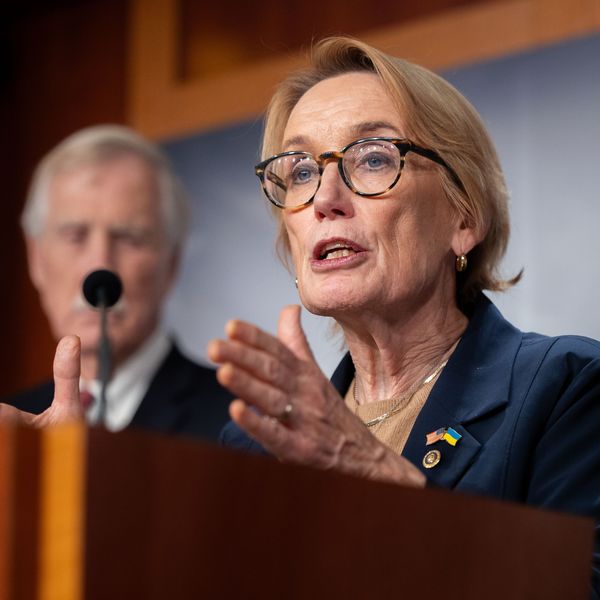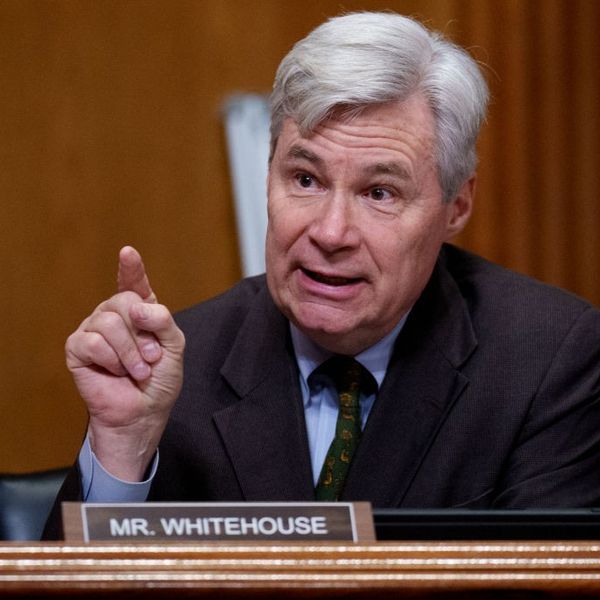Demanding Special Prosecutor, Democrats Invoke Senate 'Slowdown'
'If there was ever a time when circumstances warranted a special prosecutor, it is right now,' said Senate Minority Leader Chuck Schumer
Senate Democrats announced a slowdown of committee business on Wednesday as the fallout from President Donald Trump's firing of FBI director James Comey continued.
Lawmakers invoked an obscure rule that prevents committee hearings from lasting more than two hours after the Senate convenes, the Washington Post reported. That means 13 hearings scheduled for Wednesday will shut down around "lunchtime," the Post's Ed O'Keefe and Elise Viebeck wrote.
Democrats said no business as usual should continue until a special prosecutor is appointed for the investigation into alleged Russian interference in the 2016 election.
It's unclear how long the slowdown will last--but lawmakers have multiple options available to bring Senate activity to a crawl, Roll Call notes, depending on how "aggressive" they want to be. This move is one step short of the total shutdown demanded by the Trump resistance group AllOfUs.
The move prompted Senate Judiciary Committee chair Chuck Grassley (R-Iowa), to abruptly end a confirmation hearing for a deputy to Attorney General Jeff Sessions before ranking Democratic Sen. Dianne Feinstein of California got the chance.
Meanwhile, the Senate Health, Education, Labor, and Pensions Committee postponed a hearing on legislation affecting the Food and Drug Administration (FDA) so that Democrats on the panel could attend a caucus meeting on the Comey firing.
"Because of the decision last night by the president of the United States to terminate the director of the FBI and the questions that it raised we gathered together, the Democratic senators on the floor, and listened as our leader at least suggested a path for us to follow as an institution facing this constitutional question," Sen. Dick Durbin (D-Ill.) said during the meeting.
The decision was reportedly unanimous among all 48 caucus members.
Senate Minority Leader Chuck Schumer (D-N.Y.) requested that Senate Majority Leader Mitch McConnell (R-Ky.) ask Sessions and Deputy Attorney General Rod Rosenstein to hold separate closed-door meetings with lawmakers.
"If there was ever a time when circumstances warranted a special prosecutor, it is right now," Schumer said on the floor.
"I hope the Majority Leader agrees with me that we need to get to the bottom of this...and get a handle on all of the facts so that we can grapple with them," Schumer said. "I'd remind him and my Republican friends that nothing less is at stake than the American people's faith in our criminal justice system, and the integrity of the executive branch of our government."
McConnell seemed opposed to that idea, accusing Democrats of hypocrisy. But Trump's firing of Comey has sparked bipartisan backlash, with several prominent Republicans criticizing the decision, including Senate Intelligence Committee Chairman Richard Burr of North Carolina, Senate Foreign Relations Committee Chairman Bob Corker of Tennessee, and Sen. Jeff Flake of Arizona, whom the Post notes is up for reelection next year in a now-heated contest as anti-Trump sentiment soars.
An Urgent Message From Our Co-Founder
Dear Common Dreams reader, The U.S. is on a fast track to authoritarianism like nothing I've ever seen. Meanwhile, corporate news outlets are utterly capitulating to Trump, twisting their coverage to avoid drawing his ire while lining up to stuff cash in his pockets. That's why I believe that Common Dreams is doing the best and most consequential reporting that we've ever done. Our small but mighty team is a progressive reporting powerhouse, covering the news every day that the corporate media never will. Our mission has always been simple: To inform. To inspire. And to ignite change for the common good. Now here's the key piece that I want all our readers to understand: None of this would be possible without your financial support. That's not just some fundraising cliche. It's the absolute and literal truth. We don't accept corporate advertising and never will. We don't have a paywall because we don't think people should be blocked from critical news based on their ability to pay. Everything we do is funded by the donations of readers like you. Will you donate now to help power the nonprofit, independent reporting of Common Dreams? Thank you for being a vital member of our community. Together, we can keep independent journalism alive when it’s needed most. - Craig Brown, Co-founder |
Senate Democrats announced a slowdown of committee business on Wednesday as the fallout from President Donald Trump's firing of FBI director James Comey continued.
Lawmakers invoked an obscure rule that prevents committee hearings from lasting more than two hours after the Senate convenes, the Washington Post reported. That means 13 hearings scheduled for Wednesday will shut down around "lunchtime," the Post's Ed O'Keefe and Elise Viebeck wrote.
Democrats said no business as usual should continue until a special prosecutor is appointed for the investigation into alleged Russian interference in the 2016 election.
It's unclear how long the slowdown will last--but lawmakers have multiple options available to bring Senate activity to a crawl, Roll Call notes, depending on how "aggressive" they want to be. This move is one step short of the total shutdown demanded by the Trump resistance group AllOfUs.
The move prompted Senate Judiciary Committee chair Chuck Grassley (R-Iowa), to abruptly end a confirmation hearing for a deputy to Attorney General Jeff Sessions before ranking Democratic Sen. Dianne Feinstein of California got the chance.
Meanwhile, the Senate Health, Education, Labor, and Pensions Committee postponed a hearing on legislation affecting the Food and Drug Administration (FDA) so that Democrats on the panel could attend a caucus meeting on the Comey firing.
"Because of the decision last night by the president of the United States to terminate the director of the FBI and the questions that it raised we gathered together, the Democratic senators on the floor, and listened as our leader at least suggested a path for us to follow as an institution facing this constitutional question," Sen. Dick Durbin (D-Ill.) said during the meeting.
The decision was reportedly unanimous among all 48 caucus members.
Senate Minority Leader Chuck Schumer (D-N.Y.) requested that Senate Majority Leader Mitch McConnell (R-Ky.) ask Sessions and Deputy Attorney General Rod Rosenstein to hold separate closed-door meetings with lawmakers.
"If there was ever a time when circumstances warranted a special prosecutor, it is right now," Schumer said on the floor.
"I hope the Majority Leader agrees with me that we need to get to the bottom of this...and get a handle on all of the facts so that we can grapple with them," Schumer said. "I'd remind him and my Republican friends that nothing less is at stake than the American people's faith in our criminal justice system, and the integrity of the executive branch of our government."
McConnell seemed opposed to that idea, accusing Democrats of hypocrisy. But Trump's firing of Comey has sparked bipartisan backlash, with several prominent Republicans criticizing the decision, including Senate Intelligence Committee Chairman Richard Burr of North Carolina, Senate Foreign Relations Committee Chairman Bob Corker of Tennessee, and Sen. Jeff Flake of Arizona, whom the Post notes is up for reelection next year in a now-heated contest as anti-Trump sentiment soars.
Senate Democrats announced a slowdown of committee business on Wednesday as the fallout from President Donald Trump's firing of FBI director James Comey continued.
Lawmakers invoked an obscure rule that prevents committee hearings from lasting more than two hours after the Senate convenes, the Washington Post reported. That means 13 hearings scheduled for Wednesday will shut down around "lunchtime," the Post's Ed O'Keefe and Elise Viebeck wrote.
Democrats said no business as usual should continue until a special prosecutor is appointed for the investigation into alleged Russian interference in the 2016 election.
It's unclear how long the slowdown will last--but lawmakers have multiple options available to bring Senate activity to a crawl, Roll Call notes, depending on how "aggressive" they want to be. This move is one step short of the total shutdown demanded by the Trump resistance group AllOfUs.
The move prompted Senate Judiciary Committee chair Chuck Grassley (R-Iowa), to abruptly end a confirmation hearing for a deputy to Attorney General Jeff Sessions before ranking Democratic Sen. Dianne Feinstein of California got the chance.
Meanwhile, the Senate Health, Education, Labor, and Pensions Committee postponed a hearing on legislation affecting the Food and Drug Administration (FDA) so that Democrats on the panel could attend a caucus meeting on the Comey firing.
"Because of the decision last night by the president of the United States to terminate the director of the FBI and the questions that it raised we gathered together, the Democratic senators on the floor, and listened as our leader at least suggested a path for us to follow as an institution facing this constitutional question," Sen. Dick Durbin (D-Ill.) said during the meeting.
The decision was reportedly unanimous among all 48 caucus members.
Senate Minority Leader Chuck Schumer (D-N.Y.) requested that Senate Majority Leader Mitch McConnell (R-Ky.) ask Sessions and Deputy Attorney General Rod Rosenstein to hold separate closed-door meetings with lawmakers.
"If there was ever a time when circumstances warranted a special prosecutor, it is right now," Schumer said on the floor.
"I hope the Majority Leader agrees with me that we need to get to the bottom of this...and get a handle on all of the facts so that we can grapple with them," Schumer said. "I'd remind him and my Republican friends that nothing less is at stake than the American people's faith in our criminal justice system, and the integrity of the executive branch of our government."
McConnell seemed opposed to that idea, accusing Democrats of hypocrisy. But Trump's firing of Comey has sparked bipartisan backlash, with several prominent Republicans criticizing the decision, including Senate Intelligence Committee Chairman Richard Burr of North Carolina, Senate Foreign Relations Committee Chairman Bob Corker of Tennessee, and Sen. Jeff Flake of Arizona, whom the Post notes is up for reelection next year in a now-heated contest as anti-Trump sentiment soars.

